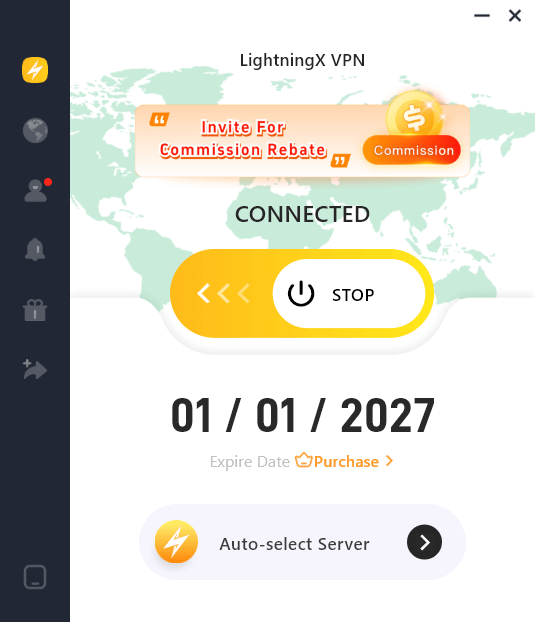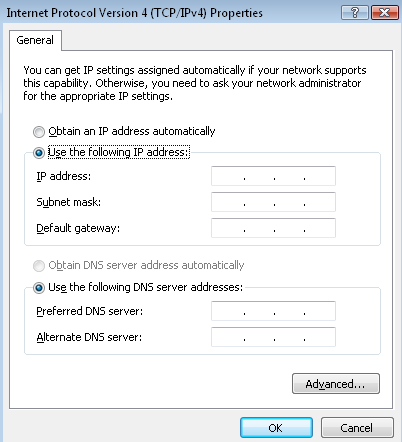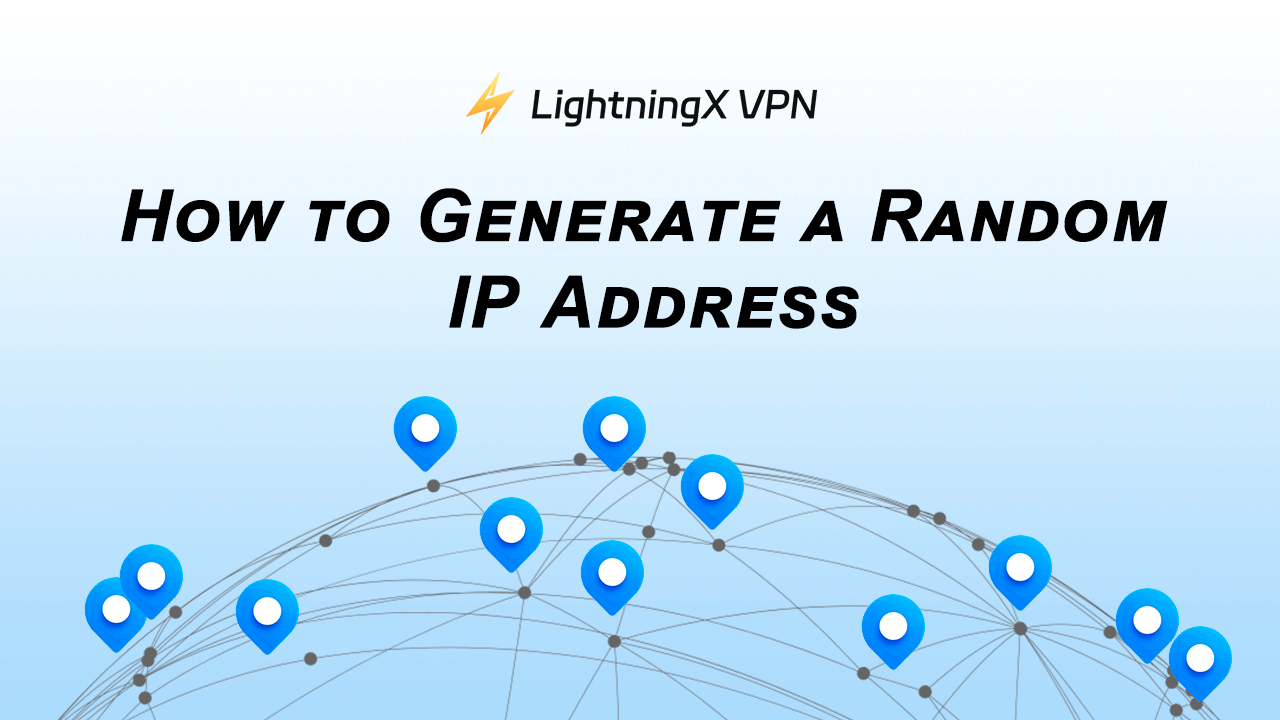IP address stands for Internet Protocol Address. It is a numerical label assigned to each device connected to a network. The devices use the Internet Protocol for communication.
Sometimes you may want to generate a random IP address for your device to protect your online privacy and security, prevent tracking, bypass geo-restrictions, stay anonymous online, test software, etc.
How to generate a random IP address? This post introduces 2 methods.
2 Methods to Generate a Random IP Address
Method 1. Use a VPN to Create a Random IP
The easiest way to generate a random IP address for your device is to use a VPN tool.
LightningX VPN is one of the most popular VPNs for Windows, Mac, Android, iPhone/iPad, TV, Linux, Chrome, Firefox, Edge, etc.
You can use LightningX VPN to easily get a random virtual IP and hide your real IP address. It helps you stay anonymous online and protect your online privacy.
With this VPN, you can easily bypass geo-restrictions and access various platforms or services, including YouTube, Facebook, Twitter, ChatGPT, Steam, Netflix, Disney+, HBO, Hulu, and more.
LightningX VPN offers a free trial. You can try it for free. You can also get a subscription to use it without restrictions, and it offers a 30-day money-back guarantee.
- Launch LightningX VPN after installation.
- Tap “Start” to automatically connect to the fastest server.
- After connecting to a server, your IP has been changed to another one. (Related: How to find IP address)

Method 2. Use Online Random IP Generators
You can find some professional online random IP address generators that can generate a list of random IP addresses for you. Below we introduce some popular tools for your reference.
IPVOID Random IP Generator
- An online tool designed to generate random IP addresses. Can create both IPv4 and IPv6 addresses.
- You can specify the number of IP addresses you need, and generate a list of IP addresses without manual creation, saving time and effort.
- Help you maintain anonymity and privacy by masking the real IP address.
- Developers and network administrators can test applications, services, and network configurations with different IP addresses.
- Simple interface, no technical expertise needed.
Other top random IP generators include:
- IPlocation Random IP Generator
- Browserling Random IP Generator
- IP Logger Random IP Generator
- Codify Formatter Random IP Generator
- Catonmat Random IP Generator
Related: How to Disable IPv6 on Windows 11/10: Step-by-Step Guide
How to Configure Your Device with a Random IP Address
Below is a step-by-step guide on how to manually set an IP address on Windows or Mac.
On Windows 10/11:
- Press Windows + I to open Settings.
- Click “Network & Internet”.
- Click “Wi-Fi” if you are using a wireless connection or click “Ethernet” if you are using a wired connection.
- Click “Change adapter options”.
- Right-click your current network like Ethernet or Wi-Fi, and select Properties.
- In the properties window, scroll down to select “Internet Protocol Version 4 (TCP/IPv4)”, and select Properties.
- Select “Use the following IP address”.
- Enter the desired IP address, subnet mask, and default gateway. For instance, IP address: 192.168.1.100; subnet mask: 255.255.255.0; default gateway: 192.168.1.1.
- Click OK to save the settings and exit.

On Mac:
- Click the Apple logo and select System Settings.
- Click “Network”
- Select the network you want to configure from the left list.
- Click the “Advanced” button in the bottom-right corner.
- In the TCP/IP tab, select the dropdown menu next to “Configure IPv4”, and select “Manually”.
- Enter the desired IP address, subnet mask, and default gateway.
- Switch to the DNS tab, and add the preferred and alternate DNS server addresses.
- Click OK to save the settings.
- Click Apply to apply the changes.
Related: How to Enable IPv6 on Windows, Mac, Android, iPhone, Router
Structure of IP Addresses
- Consist of four octets, separated by periods (e.g., 192.168.0.1).
- Each octet is an 8-bit number, ranging from 0 to 255.
- Consist of eight groups of four hexadecimal digits, separated by colons (e.g., 2001:0db8:85a3:0000:0000:8a2e:0370:7334).
- Designed to address the exhaustion of IPv4 addresses.
Types of IP Addresses
Public IP Addresses:
- Assigned by Internet Service Providers (ISPs) and are unique across the entire internet.
- Used for external communication.
Private IP Addresses:
- Used within private networks and are not routable on the internet.
- Commonly used ranges (as defined by RFC 1918): 10.0.0.0 to 10.255.255.255, 172.16.0.0 to 172.31.255.255, 192.168.0.0 to 192.168.255.255.
Static IP Addresses:
- Manually assigned and do not change over time.
- Suitable for servers and devices that need a constant IP address.
Dynamic IP Addresses:
- Assigned automatically by a DHCP server and can change over time.
- Commonly used for client devices like smartphones and laptops.
Random IP Address – FAQs
Q. What is a random IP address?
A random IP address is an IP address generated without any specific pattern or sequence. It can be used for various purposes like testing, anonymization, or educational exercises.
Q. Can I generate both IPv4 AND IPv6 addresses?
Yes, professional IP generation tools allow you to easily create both IPv4 and IPv6 addresses.
Q. Is it legal to use a random IP address?
Using a random IP address is legal for purposes like testing and development. However, using it to mask your identity for illegal activities is prohibited.
Q. How do know if a generated IP address is valid?
IPv4 consists of four octets, each ranging from 0 to 255. IPv6 consists of eight groups of four hexadecimal digits, separated by colons. You can use online IP validation tools to check the validity of an IP address.
Q. Can I use a random IP address on my network?
Using a random IP address on your network may cause conflicts if the address is already in use. A random IP may be associated with a different geographical location.
Q. Are there any limitations to using random IP addresses?
Not all random IPs are compatible with your network configuration. Make sure to comply with local laws when using random IPs.
Conclusion
This post mainly introduces 2 ways to let you generate a random IP address. If you want to use a safe IP for your device to browse online securely and anonymously, it’s advised you use a VPN like LightningX VPN. If you want to create a list of random IP addresses for testing software programs, you may utilize a professional IP generator.
















